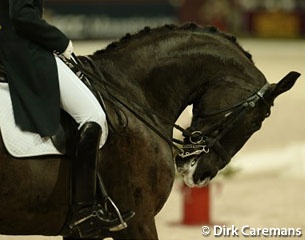
The FEI published a press release on the workshop they organized in Lausanne, Switzerland, to discuss the current critical issue of the rollkur. Following the article in St Georg about abusive training methods
that go hand in hand with riding in the rollkur, the FEI reacted by setting up a workgroup of professionals that will research the effects of over-bending for the horse's health.
Photo copyrighted: Dirk Caremans
The group of experts included: Prof Frank Odberg, Prof Leo Jeffcott, Mariette Withages, Sjef Janssen, Prof. Eric van Breda, Dr Gerd Heuschmann, Dr Andrew McLean, Prof Hilary Clayton, Dr Andrew Higgins, Dr Emile Welling, Prof Rene van Weeren.
The major conclusion they seem to have come up with is a redefinition of the German "Rollkur" into the English "Hyperflexion".
The FEI made the following statement on their first workshop:
A most productive workshop was held on 31 January 2006 at the Olympic Museum and jointly organised by the Dressage and Veterinary Committees. The point of this meeting is to reassure the “Dressage Community” that the controversial issue of “Rollkur” (overbending) is being addressed by highly experienced experts from the equine world.
The workshop included presentations and reports on this controversial training technique and its possible side-effects that may affect the welfare of the horse. It also included a review of the need for applied research.
Approximately 60 participants, including riders, trainers, stewards, veterinarians, and members of the Dressage, Veterinary Committees and Welfare Sub-Committee attended the workshop.
Objectives of the Forum
- Review the techniques of training horses
- Consider possible welfare implications
- Pros’ and cons’ from experts
- Better understanding of the biomechanics and kinematics involved in this degree of neck movement
- Reports on clinical side effects or sequelae from long term use of the technique
- Discuss possible research programmes
- Produce a report for the FEI to be able to plan the best way forward
Further to presentations of different preliminary research projects in the field of exercise physiology, radiology, biomechanics and schooling, the meeting reached the preliminary conclusion that, when applied by skilled trainers, there was no scientific evidence that this training method was abusive to the horse. There was clearly no evidence that structural damage is created by this training exercise, when used in the right way by expert riders.
However, the use of that technique by inexperienced people was a possible threat to the welfare of the horse. The role of top dressage riders as role models in the sport was underlined.
Most of the participants agreed that the terminology “Rollkur” was not comprehensible and decided it would be better to use a term which could be understood by riders, trainers and the general public. After an extensive discussion, it was proposed that the draft wording might be “hyperflexion of the neck” and a draft definition to this was established as follows:
Hyperflexion of the neck is a technique of working/training to provide a degree of longitudinal flexion of the mid-region of the neck. Hyperflexion cannot be self-maintained by the horse for an extended period of time.
As far as the FEI is concerned, the welfare and humane treatment of horses at FEI competitions, including the training areas and stables is paramount.
Next steps:
Related Links
Training Methods Under FEI Observation
Dressage Perverse Stirs the Dressage World